#frances chesterton
Note
I saw your post from 2020 about your Four Quadrants and I absolutely love them! I have wanted to get into Chesterton for a while but have never actually done it bc I have no idea where to start. I decided that you’d be likely to know where I should start based solely on my relating so much to the rest of what your post said. Do you have recommendations?
There are several answers to this question, depending on what type of writing you're interested in, because Chesterton wrote in a lot of different formats.
Novels: My favorite (and the one that feels most "Chestertonian" in the sense of embracing the joys and paradoxes of modern life) is Manalive, which is about a boarding house full of disaffected young people whose lives are upended by the arrival of the energetic and eccentric Innocent Smith, who may or may not be a dangerous lunatic. I'm also fond of his first novel, The Napoleon of Notting Hill, which is set in the far future of 1984, where the actions of two eccentric guys get London caught up in medieval warfare. That book addresses Chesterton's common theme of the tension between taking life too seriously and not taking it seriously enough, but it is a very odd book that's a bit more of an acquired taste.
Short stories: Chesterton's most enduring legacy in pop culture is the Father Brown mysteries--one of the few detectives at the time that wasn't just a Sherlock Holmes clone. These stories are half mystery and half philosophical essay, and I love them (and they're nothing like the TV show). I always tell people to start with the first collection, The Innocence of Father Brown, because the first four stories there--"The Blue Cross", "The Secret Garden", "The Queer Feet" and "The Flying Stars"--form an arc that should be read in chronological order, and the rest of the stories can be read in pretty much any order.
Poetry: Chesterton's big achievement is "The Ballad of the White Horse", a novel-length epic poem about the legends of King Alfred the Great and his war against the Danes. But if you don't feel like reading something so long, his other masterpiece is "Lepanto", a stirring poem about the Battle of Lepanto that saved Europe from a Turkish invasion (though that one is much better if you know the historical context). He also wrote this short, rather biting anti-war poem "Elegy in a Country Churchyard".
If you want something not about war, Chesterton was known for his love of Christmas, and he wrote several excellent Christmas poems, including "A Christmas Carol", "The Wise Men", "Gloria in Profundis", "Joseph" , and "A Child of the Snows".
(As long as we're talking about Christmas poems, I'm going to mention that his wife, Frances, was also a poet, and she wrote a Christmas poem every year for their family Christmas card, which include, "How Far Is It To Bethlehem" and "The Shepherds Found Thee By Night".)
Essays: Tremendous Trifles contains several of the humorous, insightful essays that are among the first things I think of when I think of the Chestertonian mindset, including "A Piece of Chalk", "The Advantages of Having One Leg", and "On Lying in Bed" . Perhaps my favorite Chesterton essay, "On Running After One's Hat" isn't in this collection, but feels like it should be.
Nonfiction: "Orthodoxy" is probably Chesterton's most famous and most accessible religious book, which outlines the worldviews that led him to embrace Christianity.
This last recommendation doesn't fit into any of the categories, but I can't finish a Chesterton introduction post without begging you to read this letter he wrote to his wife, Frances, not long after their engagement, because it may be one of the best love letters ever written.
#answered asks#g.k. chesterton#poetry#frances chesterton#father brown#manalive#the napoleon of notting hill#the ballad of the white horse#lepanto#orthodoxy
20 notes
·
View notes
Text
The Doctor Who Appreciation Society's Celestial Toymaker and Adventure in Space and Time Event
The #DoctorWho Appreciation Society's Celestial Toymaker and Adventure in Space and Time Event
I was really upset and annoyed that I had to miss the previous screening of An Adventure in Space and Time and Episode 4 of The Celestial Toymaker (i.e. The Final Test), which was the last of the Doctor Who Appreciation Society‘s screenings at Riverside in 2023. Set for the 24th November, it coincided with a train strike and so I couldn’t make it. But I was really pleased when DWAS announced that…

View On WordPress
#An Adventure in Space and Time#An Unearthly Child#Big Finish#Carole Ann Ford#Claudia Grant#David Bradley#Doctor Who Appreciation Society#First Doctor#Frances White#Ian Chesterton#James Goss#Jamie Glover#Sacha Dhawan#Susan#The Celestial Toymaker#The Gunfighters#The Master#The Myth Makers#Waris Hussein#William Hartnell#William Russell
2 notes
·
View notes
Text
Lady Hamilton - Horatio Nelson and Naples (part 23)
Lady Hamilton – Horatio Nelson and Naples (part 23)
King Ferdinand IV, described as both “timid and bigoted” and “cruel and vengeful”, who had promptly fled away, now, when victory was assured, reappeared, condemning Ruffo’s “shameful capitulation”.The betrayal of the surrenders resulted in savage reprisals against anyone suspected of having supported the Republic or dishonoured the monarch. The harshness of the Bourbon reaction, with its…

View On WordPress
#betrayal#Chesterton#criticism#denunciation#England#exile#France#king#Lady Hamilton#massacre#Naples#Nelson#Queen#Sicily
0 notes
Text
Good Omens: Lockdown, Aziraphale’s SAD-ASS desk, and how they get to 'Our bookshop' in S2
Welcome to part 2 of me reading reeaally far into the Good Omens: Lockdown video! (part 1 from Crowley's POV here) This post assumes the item choices in the Lockdown visuals are intentional. What follows is going to be my headcanon regardless, but if you're into the Word of God, Lockdown is canon 'If you want it to be.' and I want it to be, sooo checkmate! >;D
Also this is something of a long boi (~13 minute read without following the links >.>), so if you're into unhinged analysis of details and literary references that indicate Aziraphale is in his longing era and want to learn more about author and fave-of-Gaiman, G.K. Chesterton, either get comfy or mark this to read later when you have time!

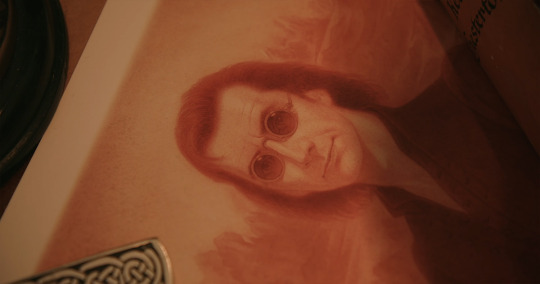
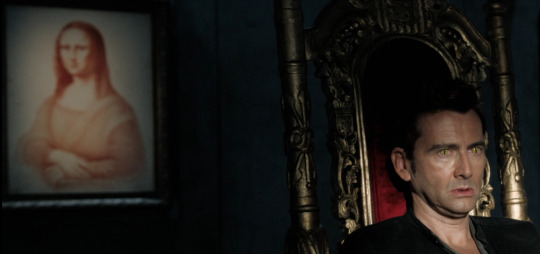
C: What?
A: *somehow surprised even though HE CALLED* A-ah, hello. It's me!
C: I know it's you, Aziraphale.
A: *regaining composure* Yes, well, just calling to see how you were doing in lockdown.
The video starts with shots of Aziraphale and Crowley's da Vinci sketches (and some sushi remnants)... Babygirl is flipping through the time-goes-too-fast-for-me version of a facebook album, thinking about his crush. vERY chill of him. (also the paper looks new and he's eating on top of them, suggesting these are prints and he has multiple copies of them... sooo normal)
If we look closer at the still of Crowley's portrait, we can see part of the spine of a book that reads Kei- Chesterto-. This is, of course, author Gilbert Keith Chesterton, to whom Neil and Terry (and Crowley) dedicated Good Omens:
The authors would like to join the demon Crowley in dedicating this book to the memory of
G. K. Chesterton
A man who knew what was going on.
In this post by @azfellandco about Chesterton, you can see a photo of the dedication page and also read the book excerpt where Crowley describes Chesterton as 'the only poet in the twentieth century to even come close to the Truth'.
C: I'm bored. I'm so very very bored - transcendentally bored. There's nothing to do here!
As Crowley is explaining his nap contingency plan, we get a shot of Aziraphale picking up his mug of hot chocolate, then the image below of the 2/3rds gone bottle of Courvoisier cognac (i mean maybe he is baking with it let's not jump to conclusions), and then the stack of books beside a framed woodcut print of witches dancing with devils...

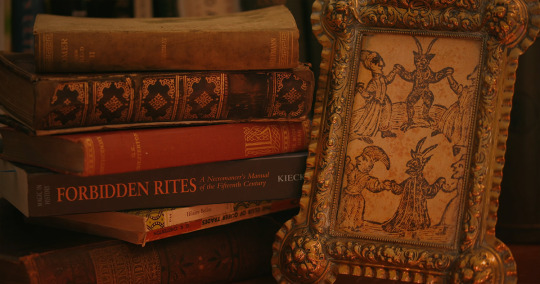
...that I used reverse image search to trace back to page 17 of a book from 1720 called The history of witches and wizards: giving a true account of all their tryals in England, Scotland, Swedeland, France, and New England; with their confession and condemnation.
Interestingly, the text above and below the picture reads:
At their Meeting they have usually Wine, or good Beer, Cakes, Meat, or the like; they Eat and Drink really: When they meet in their Bodies, Dance also, and have Musick...
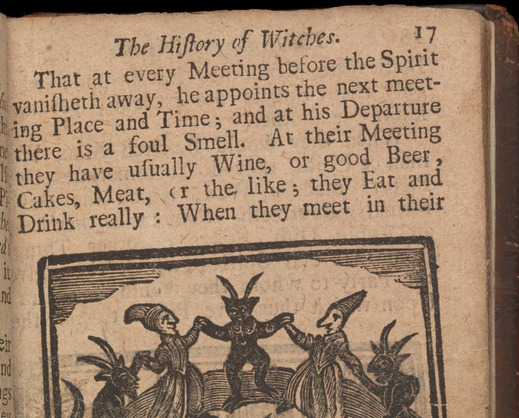
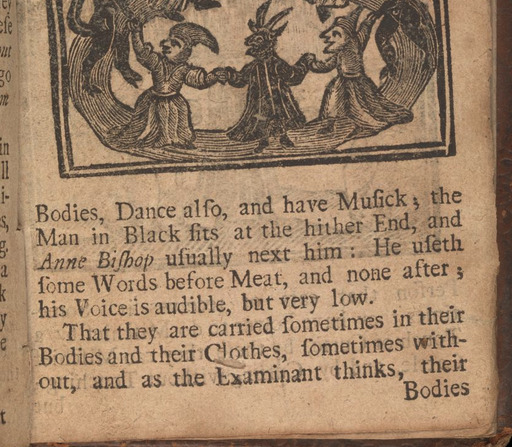
Beside the framed print of Aziraphale's idea of a really great night out is a stack of books that includes (going from top to bottom):
Homer's The Iliad, Book 2
Orthodoxy by G.K. Chesterton
Forbidden Rites: A Necromancer's Manual of the Fifteenth Century by Richard Kieckhefer
a book by Hilaire Belloc with no visible title
The Club of Queer Trades by G.K. Chesterton
The Iliad (according to sparknotes) has the following major themes:

....Interesting, ok. Book 2 in particular starts with a god (Zeus) messing with someone (Agamemnon) via a dream that says he will be successful in taking Troy if he launches a full assault, balls to the (city) wall. Agamemnon, who is supposed to be leading the Achaean army to conquer Troy, believes the dream but then in a weird twist decides to test his army and be like 'jk actually I'm giving up and going home' and then is mad when the soldiers are like 'sick, to the boats!' Then Odysseus, who sparknotes tells me is the most eloquent of the Achaeans, gives an impressive speech to inspire the troops and reminds them that they vowed 'that they would not abandon their struggle until the city fell.' ...No way that could worsen Aziraphale's internal conflict about being a bad Angel who thwarted the Great Plan. >.>; Orthodoxy we'll get to in a second.
Then there's Forbidden Rites which is a medieval necromancy guide translated from Latin with added commentary - Aziraphale is perhaps studying occult topics in an attempt to understand Crowley better? And then there's the Hilaire Belloc book on top of the second Chesterton book, a collection of related stories/episodes?, The Club of Queer Trades. The book's Wikipedia page says:
Each story in the collection is centered on a person who is making his living by some novel and extraordinary means. To gain admittance [to the Club of Queer Trades] one must have invented a unique means of earning a living and the subsequent trade being the main source of income.
Aziraphale and Crowley have rather novel/extraordinary jobs and they're both peculiar-queer and gay-queer. Neat. The narrator in the book is named Charlie "Cherub" Swinburne - also neat. >.> He goes on an adventure with his friend, a retired judge and president of the Club of Queer Trades, Basil Grant, (who Oct 2021 GoodReads reviewer Cecily said is "described as mad, mystical, and a poet, with almost no friends, but who “would talk to any one anywhere”) and Basil's younger brother, a private detective named Inspector Constable Rupert Grant. The last line of the book is:
Thus our epic ended where it had begun, like a true cycle.
(something something "It starts, as it will end, with a garden.")
Anyway, the Belloc book and The Club of Queer Trades are placed back to back in such a way that they almost look like they could be one book with two different aesthetics, or... two halves of a pantomime beast?! (stay with me I needed a segue)

Belloc and Chesterton have what is essentially a ship name:

It was coined by George Bernard Shaw (if you are like me and didn't know why you've heard of him: he wrote, among other things, Pygmalion, which was adapted into My Fair Lady). Shaw apparently liked to gossip about Belloc and Chesterton with H.G. Wells (again if you're uncultured like me: he wrote, among other science fiction-y things, The War of the Worlds).
In the Feb 15, 1908 issue of The New Age newspaper, Shaw said:

He continued:
"Chesterton and Belloc are so unlike that they get frightfully into one another’s way. ... They are unlike in everything except the specific literary genius and delight in play-acting that is common to them, and that threw them into one another’s arms.”
Shaw says Belloc is 'a bit of a rowdy', and 'cannot bear isolation'. Hmm. Then he says Chesterton is 'friendly, easy-going, unaffected,
gentle, magnanimous, and genuinely democratic'. HMM.
“They share one failing—almost the only specific trait they have in common except their literary talent. That failing is, I grieve to say, addiction to the pleasures of the table.”
Ok ok I think we can see where this is going.
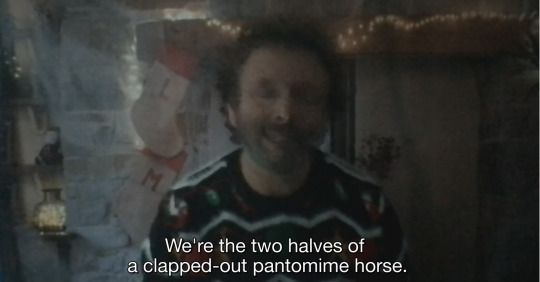
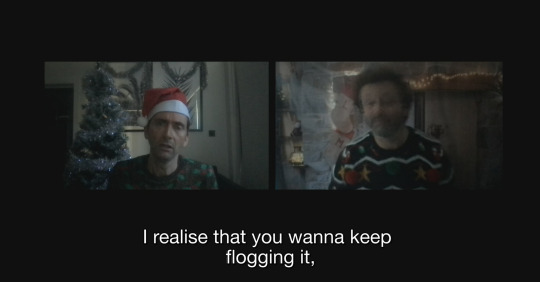

(^ from Staged S3E6)
Now, someone did ask Neil Gaiman about this similarity, and he said the Lockdown video was filmed by Rob Wilkins in Terry Pratchett's library, and that he suspects 'Belloc is there because he was on Terry's shelves beside Chesterton.' And it MAY VERY WELL BE that NONE (0) of the book titles are meant in any way other than 'these are books from Sir Pratchett's library that looked nice on camera and ofc we wanted some Chesterton refs and maybe some demon-y stuff for Crowley' but that is WAY less fun so I am choosing to take them as intentional: these are books Aziraphale is actually reading (along with the sushi and many cakes he is actually eating). Let's put ourselves in Aziraphale's shoes and try to imagine how it would be to read this stuff during lockdown while you pine for a demon with slinky hips after you got in big trouble at work for Armageddoff (and work happens to have defined your worldview and general purpose in life).
C: welll... ngk then people might follow my bad example and get ill. Or even die—
As Crowley acknowledges that he ought to be out making peoples' lives worse, we see Orthodoxy by Chesterton open on the desk.
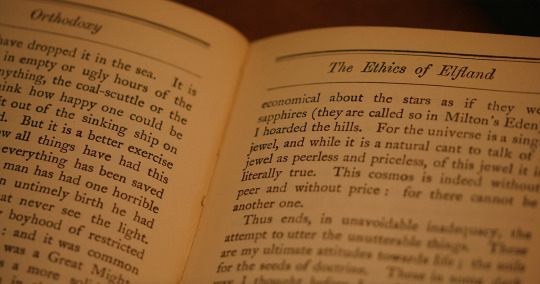
Orthodoxy is described as a ‘spiritual autobiography’ and is considered a classic of Christian apologetics, i.e. the religious discipline of defending religious doctrines (in this case, Catholic) through systematic argumentation and discourse. Wikipedia also says Chesterton's The Everlasting Man contributed to C.S. Lewis' conversion to Christianity, so overall it sounds like he must've been fairly convincing. (and so maybe reading it also poked at that work-related-but-religious-trauma-adjacent stuff Aziraphale has going on?)
You can read Orthodoxy (and probably any of the books I mention bc theyre all old) on project gutenberg but I will include this part of what is shown on the righthand page bc it just reminds me (and so probably Azirapalala as well) of a certain angel squeaking happily at a nebula:
"I felt economical about the stars as if they were sapphires (they are called so in Milton's Eden): I hoarded the hills. For the universe is a single jewel, and while it is a natural cant to talk of a jewel as peerless and priceless, of this jewel it is literally true. This cosmos is indeed without peer and without price: for there cannot be another one."
Ok great, so Aziraphale is diving into the works of one of Crowley's favorite authors bc he misses him, that's cute. What else? Oh he already wrote him a letter right before calling - THE WICK ON THE WAX STICK FOR THE SEAL IS STILL SMOKING. sO CASUAL asdashgfjds
something something 'either call on the phone and talk, or appear mysteriously; don't do both'


When Aziraphale gets to 'I've never had so few customers, not in two hundred years!' We get a close up of this glass of cognac with droplets still on the side — I take back what I said about baking, Aziraphale is drinking it~
He's not drinking a wine, eg Châteauneuf-du-pape, which would be ~14% alcohol by volume (ABV), or a sherry (15-20% ABV); he is drinking Courvoisier cognac, a hard liquor (40% ABV). Crowley's Talisker whisky is 48.5% while we are on the topic. This is stronger than what Aziraphale usually drinks which means... he could be a bit tipsy.
As Aziraphale starts talking about the would-be cash-box burglary, we get this wide shot of the desk:

In the top left hand corner, we see two stacks of books, most (all?) of which appear to be Chesterton when I zoom in. Some of them have Chesterton's name visible on them, others have the publisher name 'Darwen Finlayson' on them, which according to my googling is a house that published several of Chesterton's works. If Chesterton was truly 'a man who knew what was going on', then perhaps this is Aziraphale seeking not just to feel closer to Crowley, but also to make sense of the warring ideas in his mind. Interestingly, Chesterton has also been described as 'The Eccentric Prince of Paradox'.
C: *clearly amused* Did you smite them with your wroth?
The screen then shows two occult-y books and a flickering candle (lower left image). Then Aziraphale explains about his cake~, and as Crowley cuts him off because he's about to nervously ask to come over bc he is so so lonely & down bad for a certain angelic bookworm, we see a map of Oxfordshire on top of Pilgrim's Progress (lower right image).
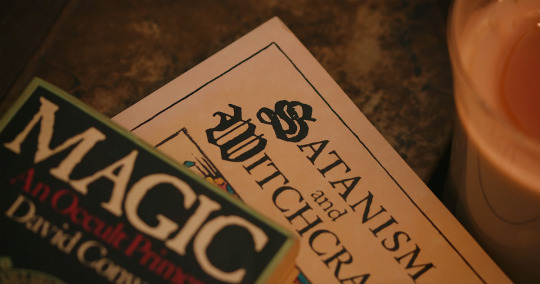
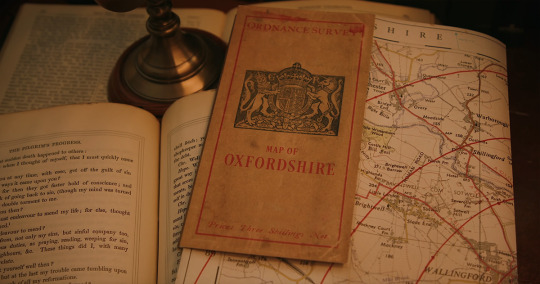
The two books beside the candle are Satanism and Witchcraft (presumably the 1862 book by Jules Michelet that comes up when I search the title), and another called Magic: An Occult Primer.
Satanism and Witchcraft is described on Wikipedia as 'notable for being one of the first sympathetic histories of witchcraft' and says 'Michelet was one of the first few people to attempt to show the sociological explanation of the Witch Trials.’ Sympathy for people who like to eat/drink/dance with demons, if you will?
Magic: An Occult Primer is a 1972 book by David Conway, a Welsh (CACHU HWCH!) magus and is described as 'a seminal work that brought magical training to the every-magician'. It also includes an appendix called The Occult Who's Who, which is somewhat reminiscent of Hastur's Furfur's book about angels. In Chapter 11: A Word About Demons, it says in regard to summoning them:

"Assuming that the form has turned up in the right place, it will soon begin to act and talk in a very friendly manner; do not forget, however, that its winning ways conceal a sinister intention-- namely, to get the adept out of the circle, and into its clutches.”
...okay?? Aziraphale's desk has a flickering candle on it throughout the video, and we get a close up of the flame when Crowley offers to slither over:
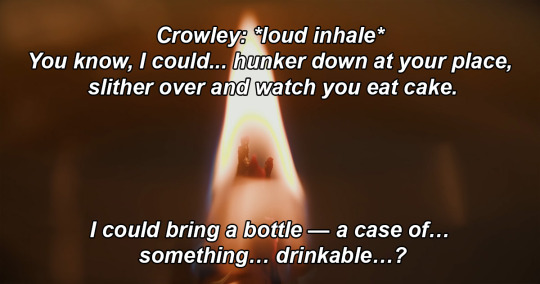
and just like that, Aziraphale has summoned a demon~~
Naturally, he freaks out:
A: *panicking*Oh I— I— I— I— I'm afraid that would be Breaking All The Rules! *nervous breathing* Out of the question! I'll see you… when this is over.
But why? Isn't this what he wanted? Let's go back to the Pilgrim's Progress shot from right before the successful demon summoning and zoom in:
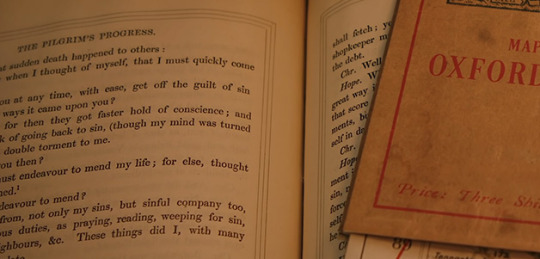
In a similar vein to Orthodoxy, Pilgrim's Progress, by John Bunyan, is an allegorical Puritan conversion narrative. Christian is the main character / stand in for anyone who wants to be in the allegory and Hopeful is well, hopeful, from what I gather. A slightly larger continuous excerpt is here for the curious, but here are some bits I thought were especially interesting in the part of the book shown above:
Christian: Why, what was it that brought your sins to mind again?
Hopeful: Many things; as,
If I did but meet a good man in the streets; or,
If I have heard any read in the Bible; or,
If mine head did begin to ache; or,
If I were told that some of my neighbors were sick; or,
If I heard the bell toll for some that were dead; or,
If I thought of dying myself; or,
If I heard that sudden death happened to others;
But especially when I thought of myself that I must quickly come to judgment.
Perhaps the pandemic is bringing Aziraphale's "sins" to mind again, on top of the whole choosing faces thing to avoid 'quickly coming to judgment'. And then:
Hopeful: I thought I must endeavor to mend my life; for else, thought I, I am sure to be lost forever.
Christian: And did you endeavor to mend?
Hopeful: Yes, and fled from not only my sins, but sinful company too, and betook me to religious duties, as praying, reading, weeping for sin, speaking truth to my neighbors, etc.
UM??? While I can't say about the praying or weeping for sin, he has definitely been reading and the whole 'giving a good talking to' the burglars could be 'speaking truth to [the] neighbors'...?
Anyway to recap:
Aziraphale has been poring over books about dark magic and demons as well as a ton of books by an author that Crowley loves and who formed a partnership w a very different person in a sort of yin-yang, pantomime beast situation
He has been looking at pictures that remind him of their fun times w Leo in Florence and eating sushi and cake cake cake (and forgiving sinners) and drinking hot chocolate and cognac trying to fill a void but now he's tipsy so he wrote Crowley a letter, stamped it with a wax seal and then thought 'I should call her' BUT
His recent brush with attempted death penalties, the death toll of the pandemic, and some of the religious books he was reading have also filled him with guilt/fear over disobeying Heaven, who he knows could still be watching him and Crowley, so he feels much more conflicted than usual AND
He probably has some inkling that he wants to go ape shit on that ox rib if it comes over to hang out (lol editing to add bc i remembered ox rib discourse: ape shit in an emotional way! whether you hc them as ace or not I just think he really likes him and I’m using ox ribs as a stand in for general forbidden joy/love, not specifically sexy stuff)
So he has to say no.
Anything else might cause him to spontaneously discorporate into a plume of pining and cognitively dissonant gay smoke, which may be all well and good if you only think there's a God, but if you KNOW it and the angels are absolutely recording you and Heaven just tried to kill you and your wife colleague, it's... kind of a big deal.
C: Right. gnnehh. I'm setting the alarm clock for July. Good night, angel.
*dial tone*
We don't get to hear Aziraphale's response, but besties you and I both know he is not feeling tickety-boo. He spent like a month putting off calling Crowley (UK lockdowns started end of March, the call is at the beginning of May), finally got drunk and said what the Hell, it'll just be a fun flirty chat in between his temptations, and then it turned out Crowley was depressed and not going anywhere and Aziraphale made him even sadder. And then it got worse because it wasn't all over in July, or in October, even.
I think Aziraphale ends up with a lot of time and brain space in which to think about how Orthodoxy and Pilgrim's Progress were only written to guide *mortals* and how it really wouldn't be so bad if he spent more time with Crowley, would it? Heaven hasn't reached out in actual years again, things feel safer. Crowley is essentially Good and spending time with him would be sort of ministering to the downtrodden and afflicted, and Aziraphale does miss reporting his good deeds (lol you know, whatever rationalizations you need to get you there).
More than anything, he thinks about how hollow everything feels without Crowley; how no mouthful of food or drink tastes as satisfying in his absence because it wasn't ever just about the 'gross matter'...
So when lockdowns end, Aziraphale begins to summon his demon again, but this time with much less inner struggling. It all comes so naturally, when you let it. By the beginning of Season 2 in 2023, they seem delightfully comfortable with their shared routines and places (see also this lovely post by @nightgoodomens). Our car. Our bookshop.
Aziraphale might take longer to catch up, but he does get there.
(SHHH DON'T THINK ABOUT EPISODE 6! STOP! I'M HANGING UP!)


“The way to love anything is to realize that it may be lost.”
― G.K. Chesterton
#good omens meta#good omens analysis#good omens#ineffable husbands#good omens lockdown#ineffable idiots#IF YOU READ TO THE END ILYSM but you're probably sitting like a shrimp now so please stretch and hydrate <3#i've connected the dots#(you haven't connected shit)#maybe i created the dots myself but i connected them#lol i essentially wrote a fixit meta bc the first meta was so sad#long reads#neil gaiman#rob wilkins#tw alcohol#g. k. chesterton#hilaire belloc#the chesterbelloc#aziraphale fumbling a bitch so damn hard#michael sheen's clapped-out sore buttocks
320 notes
·
View notes
Text
“In one letter [to Frances, Chesterton] signs himself as ‘always your own adoring nuisance,’ adding as a postscript: ‘By the way,—I love you. I thought the fact might interest you.’”
— Ian Ker: G. K. Chesterton: A Biography
120 notes
·
View notes
Text
Thank you, @rowenabean, for tagging me to share twenty(-five) books dear to me. Insert ramble full of caveats and non-definitiveness, because I am an overthinker. But whatever. Let's do this. Here's what I got off the top of my head:
The Hobbit and The Lord of the Rings by Tolkien
How a Book is Made by Aliki
Stalky and Co. by Rudyard Kipling
The Works of Shakespeare (but most especially "Henry V," "Much Ado About Nothing," "Richard III," and "Romeo and Juliet")
Twilight Robbery by Frances Hardinge
Five Children and It by E. Nesbit
Great Tales from English History by Robert Lacey
The Man from Rocca Sicca by Reginald M. Coffey OP
The works of G. K. Chesterton (but especially The Ball and the Cross and The Napoleon of Notting Hill)
"The Man of Destiny" by George Bernard Shaw
Rosie Backstage by Amanda Lewis
Emily of New Moon and Emily Climbs by L. M. Montgomery
The Shadow of the Bear by Regina Doman
The Last Unicorn by Peter S. Beagle
The Hero's Guide to Saving Your Kingdom by Christopher Healey
The Iliad of Homer
The Brothers Karamazov by Fyodor Dostoevsky
The Works of C. S. Lewis (but especially The Screwtape Letters, The Abolition of Man, and The Chronicles of Narnia)
A Canticle for Leibowitz by Walter Miller
The Dialogues of Plato
The Works of Charles Dickens (especially David Copperfield, Nicholas Nickleby, The Pickwick Papers. A Tale of Two Cities, A Christmas Carol... um, better reel it in here.)
The Stormlight Archive series by Brandon Sanderson
The Man Born to Be King by Dorothy L. Sayers
"A Man for All Seasons" by Robert Bolt
The collected works of James Herriott and Gerald Durrell hiding in the cloakroom and holding out a single calling card in hopes of passing for one book.
No-pressure tagging anyone who's interested, but especially @informedimagining, @kindredspiritsnotsorare, @marietheran, @firefly-nightsky, and @mademoiseli.
Feel free to do 5, or 10, or 15, or whatever makes you happy.
17 notes
·
View notes
Text
Lockwood & Co Quote x Screencap Posts:
“What Resembles The Grave But Isn’t” x the Portland Row trio
“Hello My Old Heart” x Anthony Lockwood
“Chinese Satellite” x Anthony Lockwood
“Let’s Get Married” x the Portland Row trio
“The Cold” x Anthony Lockwood
“Electric Touch” x Lucy
Lockwood & Co Meta Posts
Lockwood, Courage, Chesterton, & Death
Lucy and Self-Sacrifice
Lucy, The Room, and Fairy-Tales
Creeping Shadow, Unconditional Love, and Selflessness with @magpie-trove
Lockwood & Co Crossover Posts:
B99 x Lockwood & George
Parks & Rec x Lockwood & Flo
John Mulaney x Lucy
The Good Place x Lockwood
The Bear x Lockwood & Flo
Tan France x Lucy
New Girl x Lockwood & Co series
Miraculous Ladybug x Lockwood & Co
James Acaster x Lockwood
BTVS x Kipps
ATS x Locklyle
Lockwood & Co fanfiction:
“harmonies for the left behind” a Mary and Lucy Carlyle story
Other Tags:
Lockwood & Co liveblogging tags: the show and the books
general show tag for reblogs
songs and lyrics for Lockwood & Co
#including the bear post like *james acaster voice* some of the jokes are sad#what’s the point of this post you ask?#well I’m a lockwood blog now and I wanted to fix the tagging system before it was way too late#might fuck around and tag every gifset by episode someday#masterpost
21 notes
·
View notes
Text
GK Chesterton, ou l'intelligence faite Homme (à l'image de Dieu ?)
C'est en 1908 que Gilbert Keith Chesterton écrivit, dans “Orthodoxie”, cette analyse formidable et cruelle : “Le monde moderne est rempli d’anciennes vertus chrétiennes devenues folles” . En dix petits mots tout simples, tout est dit, le passé proche, encore menaçant comme des cendres mal éteintes, notre présent ravageur et si anxiogène, et notre futur proche, qui s'annonce sinistre et dévoreur hélas, d'après ce que nous pouvons apercevoir de ses contours. Le futur plus éloigné, s'il doit y en avoir un –ce qui, ‘les choses étant ce qu'elles sont et le monde ce que nous voyons’’, comme Henri Tisot le faisait dire à De Gaulle, semble de plus en plus compromis– On verra, le temps venu. Mais l'affaire a l'air mal engagée
Les courageux lecteurs habituels de ce Blog étant au courant de mon admiration pour Chesterton –je veux dire : pour l'homme qu'il fut autant que pour les idées qui furent les siennes et dont la transmission nous aide tellement à survivre à toutes les horreurs que les nains qui nous mènent (à l'abattoir)– j'avais donc prévu de rédiger à leur intention un “édito” consacré à ce géant de la pensée, pour que ceux qui ne le connaissent pas bien ou pas assez puissent tout de même se frayer un chemin dans le dédale de mes évocations… Mais au moment où je me suis installé devant mon clavier pour me “mettre au boulot”, j'ai été , au pied de la lettre, submergé par tout ce que j'avais à raconter. Une idée m'est alors venue, comme par miracle : “Qui mieux que Chesterton est à même de parler… de Chesterton ?”. Voici donc un florilège (commenté, si ou quand nécessaire, en italiques) de ses pensées les plus applicables à notre pauvre monde actuel, coincé, sans espoir apparent et en tout cas sans espérance, entre un modernisme destructeur et leur soi-disant progressisme ravageur… Je ne vois pas de manière plus efficace de comprendre pour quelles mauvaises raisons nous ‘’plongeons’’ si profondément… et si vite !
Par exemple, la phrase-référence que nous avons citée ci-dessus, se comprend mieux dans son contexte : “Le monde moderne, explique Chesterton, n’est pas méchant, Il est en fait plein de vertus, mais elles sont désordonnées et décrépites. Quand un certain ordre religieux est ébranlé (comme le fut le christianisme à la Réforme), ce ne sont pas seulement les vices que l’ont met en liberté, car, une fois lâchés, ils errent à l’aventure et ravagent le monde, maisles vertus, elles aussi, brisent leur chaînes, et les ruines qu’elles causent sont plus terribles. Le monde moderne est plein d’anciennes vertus chrétiennes devenues folles. Folles parce que, isolées l’une de l’autre, elles se mettent à vagabonder toutes seules….”.
Il continue : “C’est ainsi que nous voyons des savants épris de vérité, mais dont la vérité est impitoyable, et des humanitaires éperdus de pitié mais dont la pitié est souvent un mensonge. Or plus que de cet antagonisme de la vérité et de la pitié, c’est celui de la déformation de l’humilité”.(NDLR : Il est proprement incroyable qu'il ait pu décrire, avec presque 120 ans d'avance, le “crise” dite du covid dont nous sortons à peine, blessés en profondeur pour –peut-être– 5 ou 10 ans…ou davantage encore, pour les plus “atteints” par l'une ou l'autre des mesures anti-humaines qui ont été imposées sans la moindre précaution, sans réflexion, et sans sagesse…). “Ce dont nous souffrons aujourd’hui, écrit ailleurs Chesterton, c’est d’un déplacement vicieux de l’humilité. La modestie est entrée en contact intime avec la conviction, ce qui n’aurait jamais du se produire…. (notre monde et la France, bourrés de fausses certitudes, illustrent ce propos à la perfection !)
Or un homme peut douter de lui-même, mais non de la vérité, et c’est exactement le contraire qui s’est produit. Aujourd’hui, ce qu’un homme affirme, c’est exactement ce qu’il ne doit pas affirmer, c’est-à-dire lui-même ! Ce dont il doute est précisément ce dont il ne doit pas douter : la Raison Divine. (…) (NDLR : La dernière explication va surprendre bien de hommes d'aujourd'hui. C'est qu'ils se sont laissés convaincre que la vérité divine serait, malgré sa stabilité, plus douteuse que les entassements de soi-disant ’'vérités–sic” qui nous sont assénées… et ne reposent sur rien –en tout cas sur rien qui ne soit moins douteux et moins incertain que l'Autre !).
“La nouvelle humilité fait que l’homme doute de son but, ce qui l’arrête tout à fait. (…). Le péril, c’est que l’intelligence humaine est libre de se détruire elle-même. Un petit nombre de penseurs peut, jusqu’à un certain point, faire obstacle à la pensée dans l’avenir en enseignant à la génération suivante qu’il n’y a rien de valide dans aucune pensée humaine… et c'est largement le mal terrible dont la civilisation (je veux dire : toute civilisation ! La nôtre, pour commencer… que rien, derrière n'est prévu pour la remplacer…), et l'humanité tout entière, par contre-coup, est en train de mourir –sans même que Poutine ait à se sentir poussé à balancer quelques méga-tonnes ici ou là…”. (NDLR : A chacune de mes lectures, je reste impressionné par la précision concise et précise des mots… et des situations décrites : pour un peu… si on disait : “Chesterton est dans la pièce à côté et il va sortir, devant nous…” la précision de ses prévisions ne serait pas plus étonnante !)
“Il est vain de parler, dans un tel cadre, d'un éventuel antagonisme entre la raison et la foi, car si l'on va au fond des choses, la raison est elle même, et en elle-même, un sujet-en-soi : c'est un acte de foi que de prétendre que nos pensées ont une relation quelconque avec une réalité quelle qu’elle soit. Un authentique sceptique doit, tôt ou tard, se poser la question :” Pourquoi y aurait-il quelque chose d’exact, même l’observation et la déduction ? Pourquoi la bonne logique ne serait elle pas aussi trompeuse que la mauvaise ? Si je suis logique avec moi-même, je me dois de conclure que l’une et l’autre ne sont, en dernière analyse que des mouvements dans le cerveau d’un singe halluciné ! Le monde moderne, perdu-éperdu dans ses hallucinations, a largement répondu “'Oui” à la première question et “Non” à la seconde… une fois de plus à l'opposé complet de ce que sa raison (justement) lui recommanderait, bien servie et bien suivie’’. (NDLR : “plus actuel… tu meurs ! ”). Là où le vieux sceptique, dans son vrai scepticisme, disait : “Je n’ai pas le droit de penser par moi-même. Je n’ai pas le droit de penser du tout’, le jeune sceptique proclame : ’'J’ai le droit de penser par moi-même, et ce que je pense est la vérité”, ce qui annule toute pensée et toute vérité’’. (Ce génie avait “inventé” Macron, ses supporters et ses thuriféraires longtemps avant qu’ils ne sévissent ! Quel génie !)
(NDLR : C'est d'ailleurs le drame que nous vivons (et dont on se demande de plus en plus souvent si l'humanité sortira vivante de ce faux dilemme) avec toutes, absolument toutes, les effroyables idées auxquelles souscrivent de plus en plus de nos contemporains, du “mon corps m'appartient” des fausses féministes au “j'ai envie de vivre 1000 ans’’ des soi-disant ’'transhumanistes… Ce fatras, c'est refuser d'admettre qu'Il existe une Pensée (appelons là ’'supérieure” ou “éternelle” ) qui explique en quoi il est vain, sur le long terme, de s'y opposer. Les lecteurs habituels de ce Blog savent que je l'appelle, dans mon jargon pas meilleur qu'un autre, “la justice immanente”… qu'ils croisent souvent dans ces lignes. L’'anti-pensée’’ à la mode est un mal suprême qui n’apparaît qu’en fin d’époques décadentes…).
“Car nous pouvons entendre le scepticisme en train de briser le vieil anneau des autorités et voir au même moment la raison chanceler sur son trône. Si la religion s’en va, la raison s’en va en même temps, car elles sont toutes les deux des méthodes de preuves… qui ne peuvent elles-mêmes être prouvées. Et en détruisant l’idée de l’autorité divine, nous avons presque entièrement détruit l’idée de cette autorité humaine par laquelle nous pouvons résoudre un problème de mathématiques. Nous avons essayé d’enlever sa mitre (c’est-à-dire la religion) à l’homme pontife, et la tête (c’est-à-dire la raison) est partie, et la mitre’ avec elle’.
Certains vont sans doute trouver que les idées ’'datent” ou sont émises dans un format périmé. Question : la vérité serait-elle “à envergure variable’' ? Il me semble au contraire que ce qu'il faut conserver de ce genre de confrontation entre des idées (il ne s'agit pas, ici, d’une ‘’idéologie”, fluctuante par essence) et ce que nous désignons par “la réalité” –qui n'est qu'une perception instantanée et très personnelle d'un “hic et nunc”– c'est que les premières seulement surnageront… et devraient donc, seules, être prises en compte. Grand merci, Monsieur Chesterton…
H-Cl.
8 notes
·
View notes
Text
oh 😐 i just realized this is american history and i will not get to see any of my guys….. no graves, no owen, no jünger, no eliot, no chesterton, no brooke, no gurney, the only one i think i’ll know if he even gives me the LUXURY of having him there is seeger but even that is debatable because he was in france at the time when the war started 🙁
2 notes
·
View notes
Text
Posting this as it is akin to the Ask I received last night on here
Eugenics is a social movement that supports the supposed improvement of the human population via selective breeding and other means. It was originally developed by Francis Galton, a cousin of Charles Darwin, and based upon Darwin’s theory of evolution. The word eugenics literally means “good birth” and comes from a Greek word meaning “well-born, of good stock, of noble race.” The goal of eugenics is to make the world (or at least a country) a better place by guiding the course of human reproduction and “purifying” the gene pool.
Eugenicists advocate genetic screening, birth control, segregation, transhumanism, euthanasia, compulsory sterilization, forced pregnancies, and abortion. Eugenics was practiced openly in the early decades of the 20th century in many countries, including the United States. Several state laws were passed allowing for the forced sterilization of institutionalized people. Such a law in Virginia survived a court challenge, with Supreme Court Justice Oliver Wendell Holmes, Jr., writing in the decision, “It is better for all the world, if instead of waiting to execute degenerate offspring for crime, or to let them starve for their imbecility, society can prevent those who are manifestly unfit from continuing their kind” (Buck v. Bell, Supreme Court, 274 U.S. 200, decided May 2, 1927). After WWII, eugenics by that name fell into disfavor when the extent of Nazi atrocities became known.
Margaret Sanger, the founder of Planned Parenthood, America’s largest abortion provider, was also a proponent of eugenics. Sanger railed against the “reckless breeding” of the “unfit.” In her book Woman and the New Race, she wrote, “The most merciful thing that a large family does to one of its infant members is to kill it” (Chapter V, “The Wickedness of Creating Large Families,” 1920). She desired “to breed a race of human thoroughbreds” and would rather a society “produce a thousand thoroughbreds than a million runts” (Radio WFAB Syracuse, February 29, 1924, transcripted in “The Meaning of Radio Birth Control,” April 1924, p. 111).
The Bible does not specifically mention eugenics, but the idea behind eugenics—that man can better himself by ridding the world of “undesirable” people—is definitely not biblical. And the methods promoted by eugenicists, including abortion, euthanasia, and racial segregation, are wicked practices. God told mankind to “be fruitful and multiply” (Genesis 1:28; 9:1, 7). No exception to that command is given in Scripture, and there is certainly no racial modification to that command suggested anywhere in the Bible. For social engineers to usurp God’s authority over life and death in order to create a self-defined “master race” is evil. Biblically, there is only one race—the human race—with everyone having descended from Adam and Eve. Racial discrimination and ethnic superiority go against God’s very nature: “God does not show favoritism but accepts from every nation the one who fears him and does what is right” (Acts 10:34–35).
English theologian G. K. Chesterton wrote in his 1922 book Eugenics and Other Evils, “There is no reason in Eugenics, but there is plenty of motive. Its supporters are highly vague about its theory, but they will be painfully practical about its practice” (from Chapter VIII, “A Summary of a False Theory”). Since that practice involves abortion and euthanasia, eugenics is simply murder.
Eugenics is not commonly called by that name today, but the underlying philosophy is still evident in medical genetics. Today’s genetic screening and fetal gene manipulation are vestiges of eugenics. When a possible genetic defect is diagnosed in an unborn child, some couples choose to abort the baby. Unborn children with Down syndrome are one example: in the United States, an estimated 67 percent of the unborn diagnosed with Down syndrome are aborted; in France, 77 percent; in Denmark, 98 percent; and in Iceland nearly 100 percent (“‘What kind of society do you want to live in?’: Inside the country where Down syndrome is disappearing,” cbsnews.com/news/down-syndrome-iceland, accessed 6/22/20). It’s eugenics by a different name, as people continue to attempt to identify and eliminate genetic material they consider “unfit” or undesirable.
Eugenics is a meritless and immoral social engineering experiment. It is a slippery slope in which Chesterton’s scientific madmen abrogate the authority of God and seek to create their own utopia on Earth. Centuries ago, Job lamented the evil of his day: “When daylight is gone, the murderer rises up, kills the poor and needy, and in the night steals forth like a thief” (Job 24:14). This is the role of eugenicist: killing the poor and needy and those he deems “unworthy,” preventing a “poor quality of life” (in his estimation) by taking life, denying men’s liberty, and playing God.
One day as Jesus and His disciples were walking in Jerusalem, His disciples asked about a man born blind. They wanted to know “who sinned, this man or his parents, that he was born blind?” (John 9:2). Jesus replied, “Neither this man nor his parents sinned, . . . but this happened so that the works of God might be displayed in him” (verse 3). Who are we to decide who does or does not display the works of God?
In direct contrast to eugenics, the Bible tells us to defend the weak and disadvantaged: “Uphold the cause of the poor and the oppressed. . . . Rescue the weak and the needy” (Psalm 82:4); “Blessed are those who have regard for the weak” (Psalm 41:1; see also Matthew 25:35–36; Acts 20:35). Killing the disadvantaged, culling those whom the more fortunate determine to be “unfit” for life, or weeding out the weak is ungodly to the core.
Source: https://www.gotquestions.org/eugenics-Bible.html
4 notes
·
View notes
Text
If I were to write a serious history book, it'd probably be about the wife of a famous figure in American history. Every time I read about some Great Man, I always find myself fascinated by his wife there in the background--a hugely vital part of his life, with a front-row seat to all the history connected with him, often not able to engage with it directly but still having a huge impact on the people involved. Her entire life was shaped by whatever career her husband chose, but that doesn't mean she wasn't her own person--with her own thoughts and beliefs and opinions and interests--or that what she was doing wasn't important.
I'd make sure to respect her by keeping the focus, not on what she couldn't do, or what she'd have been able to do in modern times, but what she did do in the times that she lived in, because the things that women did were vital, even if they rarely got the spotlight. I'd want to spotlight it.
#history is awesome#presidential talk#book about frances chesterton my beloved#did it exactly right#you would not believe how thrilled i was when i discovered the obscure book about civil war generals' wives on sale at the used book store#i need to get around to reading it one of these days
50 notes
·
View notes
Text

“Men did not love Rome because she was great. She was great because they had loved her.”
-G.K Chesterton
Sculpture : Ara Pacis Augustae (Altar of Augustan Peace). July 4, 13 BC the Roman Senate votes (in a constitutio) to honor the triumphal return of Augustus from Gaul and Hispania (France and Spain). January 30, 9 BC monument is dedicated. Marble (Museo dell'Ara Pacis, Rome)
3 notes
·
View notes
Text
So, not that anyone asked but these are the novels I read this year. If any of these books catch your eye let’s be friends!
(Note: these are not in any order, I kinda just put em into a wanton list without any prior organization)
Violet’s wee reading list of 2022
1. Once Upon a Time in Hollywood - Quentin Tarantino
2. Butter Honey Pig Bread - Francesca Ekwuyasi
3. Autobiography of a Yogi - Paramahansa Yogananda
4. Seize the Day - Saul Bellow
5. Storm of Steel - Ernst Junger
6. Tacky - Rax King
7. Slow Days, Fast Company - Eve Babitz
8. Stoner - John Williams
9. Hard Rain Falling - Don Carpenter
10. Anniversaries - Uwe Johnson
11. Don Quixote de La Mancha - Miguel de Cervantes
12. Killing Commendatore - Haruki Murakami
13. Burning Questions - Margaret Atwood
14. The Counterfieters - André Gide
15. Growth of the Soil - Knut Hamsun
16. The Poems of John Keats - John Keats
17. Ulysses - James Joyce
18. The New York Trilogy - Paul Auster
19. The Complete Stories of Clarice Lispector - Clarice Lispector
20. Quo Vadis - Henry’s Sienkiewicz
20. The Dwelling Place of Light - Winston Churchill (not the former PM)
21. Dharma Bums - Jack Kerouac
22. Dune - Frank Herbert
23. Dune Messiah - Frank Herbert
24. Children of Dune - Frank Herbert
25. God Emperor of Dune - Frank Herbert
26. Heretics of Dune - Frank Herbert
27. Chapter House Dune - Frank Herbert
28. Notes from Underground - Fyodor Dostoevsky
29. The Double - Fyodor Dostoevsky
30. Moby Dick - Herman Melville
31. Middlemarch - George Eliot
32. The Complete Stories of Jorge Luis Borges - Jorge Luis Borges
33. The Collins Complete Shakespeare - William Shakespeare
34. The Banjo: A History - Laurent DuBois
35. House of Leaves - Mark Z Danielewski
36. Sérotonin - Michel Houellebecq
37. Pamela - Samuel Richardson
38. The Confusions of Young Törless - Robert Musil
39. The Little Friend - Donna Tartt
40. My Struggle I: A Death in the Family - Karl Ove Knausgaard
42. My Struggle II: A Man in Love - Karl Ove Knausgaard
43. My Struggle III: Boyhood Island - Karl Ove Knausgaard
44. My Struggle IV: Dancing in the Dark - Karl Ove Knausgaard
45. My Struggle V: Some Rain Must Fall - Karl Ove Knausgaard
46. My Struggle VI: The End - Karl Ove Knausgaard
47. The Idiot - Fyodor Dostoevsky
48. The Pickwick Papers - Charles Dickens
49. Great Expectations - Charles Dickens
50. Bleak House - Charles Dickens
51. The Old Curiosity Shop - Charles Dickens
52. Nicholas Nickelby - Charles Dickens
53. Roots - Alex Haley
54. Silas Marner - George Eliot
55. Scenes of Clerical Life - George Eliot
56. Slouching Towards Bethlehem - Joan Didion
57. Iron Widow - Xiran Jay Zhao
58. Babel - R. F. Kuang
59. The Complete Father Brown Stories - G. K. Chesterton
60. Death Note: The Los Angeles BB Murder Cases - Nissoisin
61. The Blind Assassin - Margaret Atwood
62. The Song of Roland - Anon.
63. The Nibelungenlied - Anon.
64. Le Morte D’Arthur - Sir Thomas Malory
65. The Lais of Marie de France - Marie de France
66a. Sir Gawain and the Green Knight (penguin tran.) - Anon. (The Pearl Poet)
66b. Sir Gawain and the Green Knight (Tolkien tran.) - Anon. (The Pearl Poet)
67. The Pearl (Tolkien tran.) - Anon. (The Pearl Poet)
68. Les Fleurs de Mal - Charles Baudelaire
69. Faust - Goethe
70. Forrest Gump - Winston Groom
71. The Autobiography of Benvenuto Cellini - Benvenuto Cellini
72. Here There Be Dragons - James A. Owen
73. The Decameron - Giovanni Boccaccio
74. The Island - Alastair MacLeod
75. The Maltese Falcon - Dashiell Hammett
76. White Teeth - Zadie Smith
77. Beautiful Losers - Leonard Cohen
78. Take Arms Against a Sea of Troubles - Harold Bloom
79. A Song for Arbonne - Guy Gavriel Kay
80. Harlem Shuffle - Colson Whitehead
81. The Interview With the Vampire - Anne Rice
82. The Vampire LeStat - Anne Rice
83. The Big Sleep - Raymond Chandler
84. Vile Bodies - Evelyn Waugh
85. Decline and Fall - Evelyn Waugh
86. Thus Were Their Faces - Silvina Ocampo
87. The Hellbound Heart - Clive Barker
88. The Collected Works of Breece D’J Pancake - Breece Pancake
89. Ben-Hur: The Story of a Christ - Lew Wallace
90. Open City - Teju Cole
91. Goodbye to Berlin - Christopher Isherwood
92. The Aeneid - Virgil
93. Emma - Jane Austen
94. Sense and Sensibility - Jane Austen
95. Persuasion - Jane Austen
96. The Portable Sixties Reader - Various, compiled by Ann Charters
97. The Innocents - Michael Crummey
98. Crossroads - Jonathan Franzen
99. The History of Tom Jones, A Foundling - Henry Fielding
100. The Pilgrim’s Progress - John Bunyan
#bookworm#books and reading#classic literature#classic lit#classics#english literature#literature#seriously all I do is read#reading list
5 notes
·
View notes
Text
Did G.K. Chesterton have NVLD?
Did G.K. Chesterton have NVLD?
G.K. Chesterton, well-known essayist and writer of the 20s and 30s, couldn’t tie his own shoelaces. His doting mother did it for him, then later his wife, Frances Blogg. It is not known who tied his shoes in the interval between the two women.
NonVerbal Learning Disorder is an oddness in the brain which means a person doesn’t naturally pick up nonverbal social cues or basic physical things such…
View On WordPress
#nvld#nonverbal learning disorder#nld#gk chesterton#neurodiversity#neurodivergent#neurodivergence#thepromethean#prometheanwriter#theprometheanwriter#promethean#louisetaylor
2 notes
·
View notes
Text
“While the young couple were in Edwardes Square, [Kensington,] Chesterton wrote to 8-year-old Doris Child, who had been a bridesmaid along with Rhoda Bastable at the wedding and who was living with her mother with Mrs Blogg at the time: ‘I myself have become terribly good to please Frances.’
I never read at meals now; the mere sight of a book near the table makes me quite ill. I brush my hair without stopping all day: I am brushing it with one hand while I write to you with the other. This is a symbolic approximation, which means something that is not true. But I cannot help feeling that I should be better still if you were here to help Frances to make me behave well. It is very funny, but I will tell you a secret—I really want to behave well now. You must come and see us and our house and show me how. I am young and strong and can behave well for 17½ minutes on end without the least fatigue.
Below the letter were five drawings of a figure progressively brushing his hair down.”
— Ian Ker: G. K. Chesterton: A Biography
16 notes
·
View notes
Text
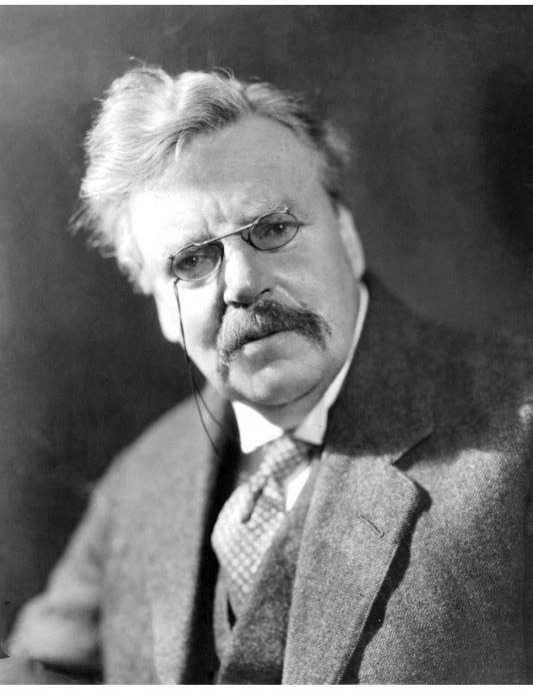
«All science, even divine science, is a sublime yellow story.
Only it's not set to reveal why a man died, but the darkest secret of why he lives."
(Gilbert Keith Chesterton, My Faith)
Gilbert Keith Chesterton, often cited as G. K. Chesterton (London, 29 May 1874 – Beaconsfield, 14 June 1936), was a British writer and journalist.
An extremely prolific and versatile writer, he wrote about a hundred books, contributed another two hundred, hundreds of poems, an epic poem, five dramas, five novels and about two hundred short stories, including the popular series starring the figure of "Father Brown" from which inspired the creation of the TV series of the same name.
He was also the author of more than four thousand newspaper essays.
He loved paradox and controversy very much, also contributing to the economic theory of distributism.
In 1900 he wrote his first collection of poems, The Wild Knight, which was followed by articles of literary criticism in the Speaker and the Daily News.
The following year he married Frances Blogg.
In 1905 he published Heretics.
Three years later, in 1908, he wrote Ortodoxy, perhaps his most important essay, a sort of philosophical autobiography, which partly continues themes that appeared in the 1905 work.
In 1909 he moved with his wife to Beaconsfield where he would live until his death.
Between 1911 and 1936 Chesterton began writing Father Brown's stories (many of which were still unpublished).
In 1914 a serious illness put his life at risk.
After the outbreak of the First World War, Chesterton founded the Distributist League with the writer Hilaire Belloc with the aim of helping the development of small property and small industry through the division and redistribution of large landholding properties.
He was a close friend of Belloc, so much so that George Bernard Shaw coined the term "Chesterbelloc" to indicate their literary and friendship partnership.
«Tutta la scienza, anche la scienza divina, è una sublime storia gialla. Solo che non è impostata per rivelare perché un uomo sia morto, ma il segreto più oscuro del perché egli viva.»
(Gilbert Keith Chesterton, La mia fede)
Gilbert Keith Chesterton, spesso citato come G. K. Chesterton (Londra, 29 maggio 1874 – Beaconsfield, 14 giugno 1936), è stato uno scrittore e giornalista britannico.
Scrittore estremamente prolifico e versatile, scrisse un centinaio di libri, contribuì per altri duecento, centinaia di poesie, un poema epico, cinque drammi, cinque romanzi e circa duecento racconti, tra cui la popolare serie con protagonista la figura di "Padre Brown" da cui fu ispirata la realizzazione dell'omonima serie TV.
Fu autore inoltre di più di quattromila saggi per giornali.
Amò molto il paradosso e la polemica, contribuendo inoltre alla teoria economica del distributismo.
Nel 1900 scrive la sua prima raccolta di poesie, The Wild Knight, a cui seguiranno articoli di critica letteraria sullo Speaker e sul Daily News. L'anno seguente sposa Frances Blogg.
Nel 1905 pubblica Eretici. Tre anni dopo, nel 1908, scrive Ortodossia, forse il suo saggio più importante, una sorta di autobiografia filosofica, che continua in parte tematiche apparse nell'opera del 1905.
Nel 1909 si trasferisce con la moglie a Beaconsfield dove vivrà fino alla morte.
Tra il 1911 e il 1936 Chesterton inizia a scrivere i racconti di padre Brown (molti dei quali ancora inediti).
Nel 1914 una grave malattia gli fa rischiare la vita.
Dopo lo scoppio della prima guerra mondiale Chesterton fonda con lo scrittore Hilaire Belloc la Lega distributista allo scopo di aiutare lo sviluppo della piccola proprietà e della piccola industria mediante la divisione e la ridistribuzione delle grandi proprietà latifondiste.
Di Belloc fu molto amico, tanto che George Bernard Shaw coniò il termine "Chesterbelloc" per indicare il loro sodalizio letterario e di amicizia.

0 notes